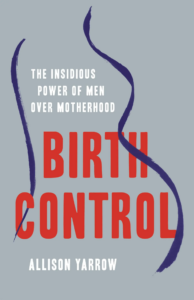In America, motherhood is dominated by a patriarchal medical industry — can Jewish tradition show the way forward?
Discussing her book ‘Birth Control,’ journalist Allison Yarrow finds reasons for concern and reasons for hope

Allison Yarrow is the author of ‘Birth Control: The Insidious Power of Men Over Motherhood.’ Photo by Beowulf Sheehan
Earlier this summer, Allison Yarrow made a splash when she talked about the “radical joy” of breastfeeding her 3-year-old in Time magazine. It was part of the launch of her new book Birth Control: The Insidious Power of Men Over Motherhood, which looks at the way the male-dominated medical industry has taken over all aspects of the birthing process.
Birth Control is the follow up to Yarrow’s 2018 90s Bitch, a finalist for the Los Angeles Press Club Book Award, about how women were maligned by the media and pop culture, losing equality, rights, and respect in the last decade of the 20th century. Her first book, The Devil of Williamsburg, was about the sex abuse trial in Brooklyn of ultra-Orthodox counselor Nechemya Weberman.
Dan Friedman talked to Yarrow, the Forward’s former deputy digital editor, about Birth Control. This conversation has been edited for length and clarity.
Tell me about your new book and the medical systems it describes.
Birth is fabulous, it’s fantastic. It’s the most powerful thing that we can do as humans, and yet, under our system of managed care, it has become an exercise in controlling those doing it. That’s for many reasons, but certainly the cost incentives are toward moving people who are giving birth through the hospital system as quickly as possible.
The care that they’re routinely getting is not based on evidence, it’s based in tradition. “We’re going to do a pelvic exam and give you Pitocin,” or, “you’re taking too long, we’re gonna give you surgery” — none of this is rooted in any good evidence. We know how to give the body what it needs: support, darkness, safety, quiet, and relative privacy. Yet hospitals deny these needs of the birthing body, indeed actively thwart them, and then provide a whole swathe of systemized medicine that’s not based on evidence.
They’re not necessarily even getting consent for some of what they’re doing. There’s something called informed consent and refusal. It’s the law and it means that in any healthcare setting, no matter who you are, you have the right to have procedures and drugs and protocols explained to you. And you also have the right to choose them — or not. No doctor or anyone else can manipulate you into doing something you haven’t had explained and agreed to.
For example, “Get up on this table, we’re going to perform an exam now,” is not an example of consenting to your care. That’s an example of being “consented to care.”
That’s a weird turn of phrase, “to consent someone” — turning “consent” into a transitive verb. You write about the whole male culture of the medical system — even if it includes women working for it — but the traditions are still quite recent though, right? Only 100 years old?
Starting from the founding of the country, birth in the U.S. was attended by Black and indigenous midwives. That was the culture until white men went to Europe to get medical degrees and came back to the U.S. to practice. Returning, they realized that the most common healthcare procedure was childbirth, so they learned about it from midwives who were happy to teach and have more practitioners out there. But then, the doctors said, “we have tools, we have drugs, we need to justify our fees for these things now.” So, from the turn of the century, they insisted that hospital births were safer than ones at home.

Meanwhile, birth at home was communal, it was sort of a sacrament — a tradition among women. From the age of a little girl, you would attend births, so you’d have seen hundreds before your own. And now in our country, we’ve moved it into the hospital, so no one sees births unless you are birthing yourself.
Even when it did initially move into hospitals, at the turn of the century, it wasn’t as safe as was promised because of puerperal fever. Since we didn’t understand bacteria or hand washing, people were dying in hospitals, so people were actually safer giving birth at home.
And moving birth to the hospitals lost so much. You know, the managed care model takes the magic, the tradition, and the beauty out of birth, but it also makes it more dangerous. And we don’t have a culture that celebrates birth. When the first birth, or only birth, you ever experience is your own, it’s hard to go into that with any kind of autonomy or without fear.
You talk about the culture of birthing before institutionalized patriarchal medicine. Is there a Jewish tradition of midwifery?
Midwifery is deeply embedded in Jewish culture and narrative in so many beautiful ways. I love the idea that Talmudic scholars put forth that some of the metaphors for God are female metaphors. In the Torah and in the Talmud, God is seen as a midwife, and the act of creation is like midwifery, which I think is incredibly beautiful and meaningful.
And I also love the Talmudic scholars who say that a pregnant body should have whatever it wants or needs, even if that means pork on Yom Kippur, which is like, completely the antithesis of everything we are usually taught. But in the case of pregnancy and birth, there’s this just Jewish understanding that women know what they need and should have it and even if that sort of threatens Jewish law, that it’s not a threat, but it’s a necessity.
And, though I hadn’t researched it for the book, per se, I was sitting at my Seder reading my Haggadah, and suddenly Shifra and Puah are presented as pivotal players, and the midwives who brought Moses into being.
Remind me, who were Shifra and Puah?
They were the midwives in Egypt when midwives were charged with systematically killing Jewish babies. But they saved the babies and, when asked, they said they couldn’t account for all the babies who were born because the Jewish women were so hardy, they were giving birth before the midwives even got there. So, they are celebrated as Jewish heroes for saving all those babies, giving hope even as the Jews were enslaved in Egypt.
Do you think that there’s hope? First, in your own journey from hospital births to a homebirth for your third child? Or in the system finding its way to a “gentle” C-section that centers the birthing person instead of treating them like cattle? Or hope in the insurance companies saying, “Let’s lower the C-section rate”? Are there other reasons to hope?
I’m hopeful because birth is just an essential, transcendent, spiritual, powerful experience. And that essential spirituality and power of it is always the beacon that I’m looking back to. And I think that as we share our stories, we have to share our birth stories and create a culture in which powerful birth stories are part of our narrative and our understandings. In a system where we aren’t told what’s possible, and we’re “consented” to care, the stories are what gives us a window into what is actually possible.
For me, this historical juncture feels like a moment of reckoning. Our maternal mortality rate has never been higher in my lifetime. But people are telling their stories, so we are learning how to sort of make better decisions in care settings.
I mean, I would never say that it’s on women to fix this. It’s not. And, even if everyone giving birth in America wanted to have midwifery care right now, they could not, because there are not enough midwives. But there are many programs. Medicaid expanding from two months after childbirth through the first year in many states is hopeful, giving more care at a critical time because we know a lot of these maternal deaths are happening after the birth.
And in certain parts of the country, now, if you have Medicaid or meet a certain income threshold, you can access free or low-cost doula support for your birth.
I’m certainly not the first person to talk about these issues. There are generations of women and midwives and supporters before me who have been doing incredible work. And I just want to provide narrative that’s helpful, keep the subject in the headlines, and make a system that affects every one of the 4 million births in the U.S. every year just a little better.























